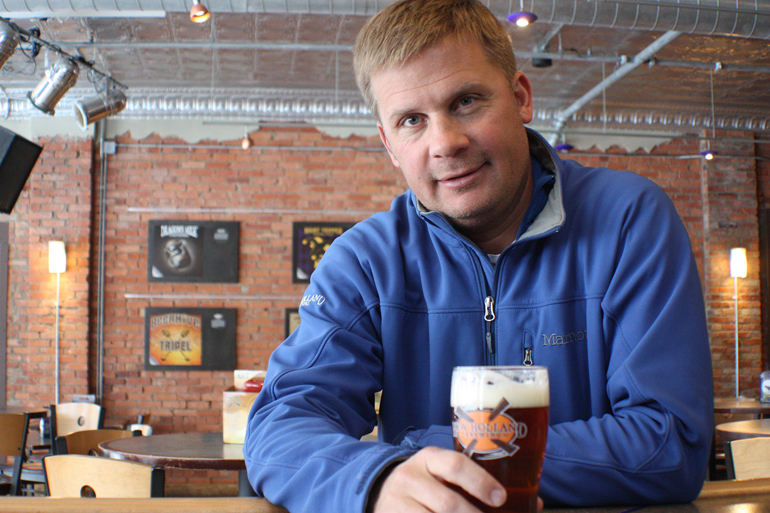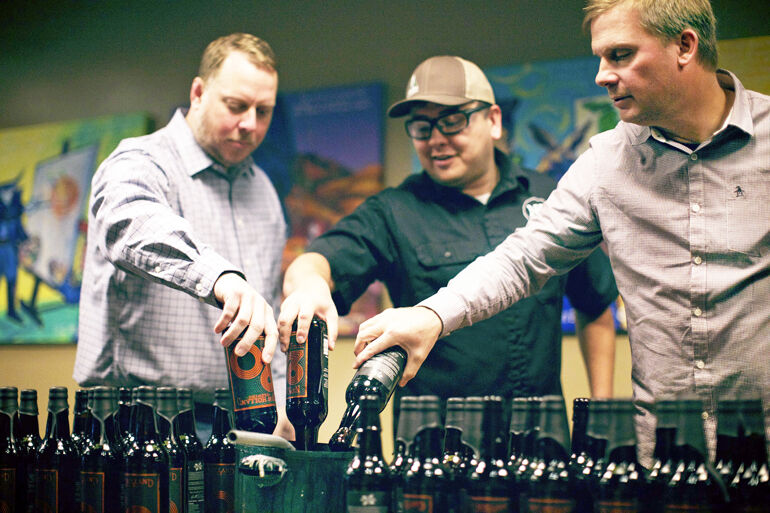Start 14-Day Trial Subscription
*No credit card required

Industry Outlook With Brett VanderKamp of New Holland
Celebrating its 20th year in the American craft beer industry, New Holland Brewing Co. has become a shining example of what craft brewing can be, and how it can be done.
Starting as a small pub in Holland, Michigan, back in 1997, the company has grown into a national entity with more than 400 employees among its brewing, distilling and restaurant operations.
At the heart of New Holland's steady growth lies a determination to "keep it craft" – readers may recall The Beer Connoisseur's previous interview with Fred Bueltmann, New Holland's resident VP of Brand and Lifestyle, aka the "Beervangelist," who strives to live a craft lifestyle in all areas of life.
In its own words, New Holland's company values are "simple, but rooted deeply in craftsmanship and artistry: People, Teams & Collaboration, Artistry, Quality, Profitability and Ambition."
The Beer Connoisseur spoke with New Holland President and Founder Brett VanderKamp to get his take on the state of the industry, where it's headed and where New Holland fits into the picture.
What issues are facing the craft brewing industry heading into 2018?
As we all know, there's been this amazing proliferation of small brewers. The overall success of craft beer as a category has made for too many breweries to keep track of.
If you're a smaller brewery, you're faced with two challenges or paths. You've either got to achieve a national footprint and start to leverage larger chain business, or you're going to have to really hunker down and own a smaller footprint – or retreat. That's what has been happening with a lot of fellow breweries that started around the same time we did – they're having to retrench and pull back.
Could that mean breweries just starting out are essentially too late to the game?
There will always be the breakout star, but in large part, I would agree with that statement. It's so hard to get oxygen to your brand outside of a very small radius, just because there are so many other breweries within 20 or 30 miles that are running the same business plan. They're not differentiating themselves. There are so many pieces of pie, you can't limit yourself to one sliver.
For us, the biggest challenge is continuing to grow nationally with core brands. We still have some gaps to grow into territory-wise, but we've been really fortunate with Dragon's Milk as a flagship. It's great liquid, it's recognized, and the margins keep retailers happy.
What does it take for New Holland to differentiate itself?
2017 was a big transition year for us. We solidified our relationship with Pabst, which in my mind was absolutely necessary to take a national footprint strategy. In a way, finding strong partners has helped differentiate us.
Also, we had to kill some "sacred cow" beers, which was very tough for me, because I was very emotionally attached to them. We had to realize our pipeline of new beers was delayed, so we had to put some beers with pretty good distribution to bed. Maybe we can wake 'em down the line, and we can make them for our pub now and again, but as far as distribution, they're done.
Earlier this year, New Holland inked a pivotal partnership with Pabst Brewing. Unlike most recent deals, New Holland managed to retain complete independence.
For those who don't know, can you explain the terms of New Holland's partnership with Pabst?
It's not an equity deal – we still have a strategic marketing team, we own the brand, all that. They help us get to market through some of their distribution partners, and we get to leverage their sales team. It's a unique partnership that's taken some time to figure out, both parties needed to get to know each other a bit more. That's coming together currently, and we expect some big wins to come out of that in 2018.
How long has the partnership been in effect?
We've only been live with Pabst for nine months or so.
How do you incentivize Pabst to sell your beer over others?
Margins. Obviously, the margins on craft brands, especially one like Dragon's Milk, are solid.

"We've been really fortunate with Dragon's Milk as a flagship. It's great liquid, it's recognized and the margins keep retailers happy." - Brett VanderKamp
Not long ago the Brewers Association began its "Take Craft Back" campaign – a tongue-in-cheek attempt to buy out AB InBev that left some bewildered. Are they doing the brewing industry a service or disservice by taking this kind of angle?
I haven't paid a lot of attention to that campaign. I'm friends with a lot of the Brewers Association folks, they've done some really good work on the tax front, and their job is not easy. It's a tough task to provide resources to the myriad sizes of breweries in their various life cycles and stages.
I think what has happened is that craft beer has won. It takes a long time to turn a tanker around, but we're seeing it turn now. We won't see the end results for a while, but you can see the loss in share that big brewers are having, and I think will continue to have. There will be a bunch of battles, but I think we've won the war. Craft beer has arrived. It's legitimate, and we're not trying to prove its legitimacy anymore.
Growing up, my father had one of two beers in the fridge. One of them coincidentally, was Pabst, and one was Budweiser. Usually I could tell how his paycheck looked depending on which beer was in there. Now, if you looked in the majority of fridges in America, there's craft beer in there. When kids today grow up, they will have been exposed to craft beer. That big hurdle of education is no longer there, and some people might not realize how powerful that is. Because craft beer education used to be a huge hurdle.
What does 2018 hold for New Holland?
The lifecycle ran down on some of our long-term brands as I mentioned, and we're bringing out some new ones – Tangerine Space Machine, an IPA, and a fruit beer, Passion Blaster. Those are new frontiers for us. We've been out of the fruit game, and haven't introduced a new brand in years. We're adapting and experimenting.
We have been behind the curve as far as the big can revolution is concerned. Moving our beers into cans is an ongoing process – we're working on migrating Mad Hatter IPA into a can.
We're going to continue innovating and growing Dragon's Milk, and adding new variants. You can expect a Salted Caramel Dragon's Milk, among others. That's a change we've seen – sacred elements you wouldn't touch. These variants are a chance to bring energy back to the core beer. The continued growth of the Dragon's Milk brand is what I'm most proud of from a product standpoint.
New Holland has stayed ahead of the curve in other areas – moving into the distilling arena, and opening a flagship brewpub in Grand Rapids' historic West Side, which serves its handcrafted brews, spirits and cocktails along with wine and cider.
How is business at the Knickerbocker Pub?
It has exceeded our expectations. It's surpassed our Holland business as far as revenue and sales are concerned. The facility is large, and it's really turning into a cornerstone for the area. We're very happy with it.
Is that a model you might replicate down the line?
It is something that we would look to do in the future, but not at the scale we did with the Knickerbocker. If we were to move to another location, it would be downsized, but we have no plans to do so in 2018. Our focus this coming year is letting our relationship with Pabst mature. We've had a good year in 2017 coming off a flat year in 2016. Over 15 percent growth, largely due to our Pabst relationship. There are logistical aspects we need to hone, but it is our focus.
Where does New Holland stand on the production end?
We're at 50 percent capacity – 40,000 bbls, and we can get to 70-80,000 with our current facility. We'll need to look at warehouse expansion for Dragon's Milk, but we're not trying to max out any time soon. We're still filling in some gaps in distribution in current territories, but we're not looking to expand territory-wise.
Looking back on 20 years, what has helped New Holland really entrench itself in the industry?
We have great people on our team. It can sound old, but from the guys on the bottling line to the servers, our team embodies what we're all about and that's what makes the difference.
How do you put together a great team?
Culture is everything. We've had time to work on ours and have really made an effort to make it special. That's what brought us to where we are, and allowed us to make a deal with Pabst. You could point to good beer and business decisions, but even those decisions start with good people, and good people are attracted to good culture.



